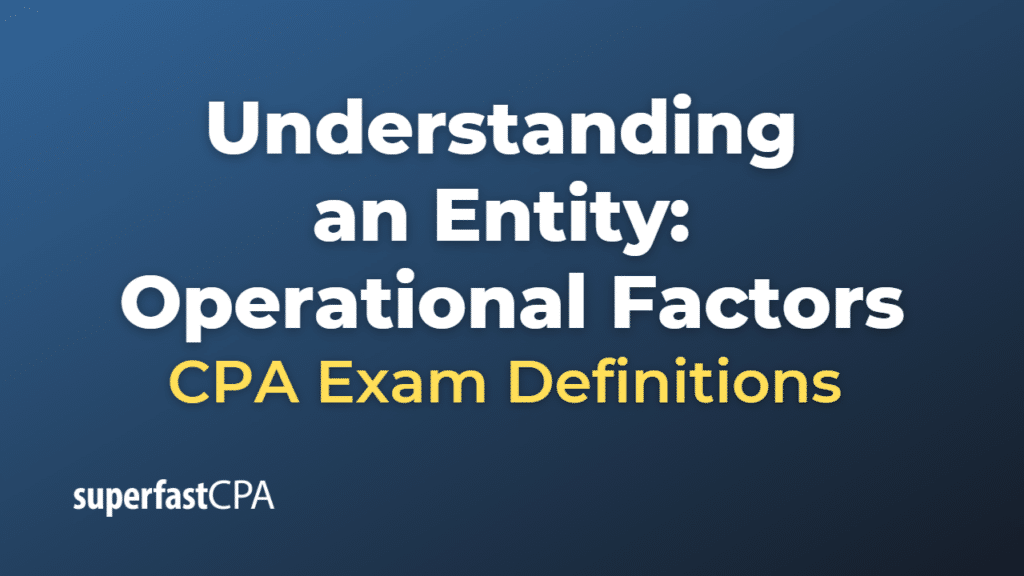Understanding an Entity: Operational Factors
Operational factors define the nature of an entity by influencing its day-to-day activities, business processes, management structure, and overall functioning. These factors can impact the risk of material misstatement in the entity’s financial statements. Some operational factors and their potential impact on the risk of material misstatement include:
- Business model and strategy: An entity’s business model and strategy can determine its revenue streams, cost structure, growth plans, and competitive positioning. Different business models and strategies can result in varying degrees of complexity, which may affect the risk of material misstatement in financial statements.
- Organizational structure and management: An entity’s organizational structure and management style can impact its internal control environment, decision-making processes, and allocation of responsibilities. Complex or decentralized structures can lead to increased risk of material misstatement due to inadequate oversight, communication gaps, or lack of segregation of duties.
- Operating processes and procedures: An entity’s operating processes and procedures can affect the efficiency and effectiveness of its operations, as well as the accuracy and completeness of its financial reporting. Inefficient or poorly designed processes and procedures can increase the risk of errors, fraud, or material misstatement in financial statements.
- Internal control environment: The effectiveness of an entity’s internal control environment, including the design and implementation of controls, can significantly impact the risk of material misstatement. Weaknesses in internal controls can lead to increased risk of errors, fraud, or material misstatement in financial statements.
- Human resources and personnel: An entity’s human resources, including the skills, knowledge, and competencies of its employees, can impact the quality and accuracy of its financial reporting. Inadequate staffing, high turnover, or lack of training can increase the risk of material misstatement in financial statements.
- Information systems: An entity’s information systems, including accounting software and data management tools, can impact the reliability and accuracy of its financial reporting. Inadequate, outdated, or poorly maintained systems can increase the risk of material misstatement due to data inaccuracies or system failures.
Operational factors can influence the risk of material misstatement in several ways:
- Complexity of transactions: Complex operational factors can increase the complexity of an entity’s transactions, such as accounting for long-term contracts, revenue recognition, or inventory management, potentially increasing the risk of misstatement.
- Estimation uncertainty: Operational factors can create uncertainties in the estimation of assets, liabilities, or provisions, leading to a higher risk of material misstatement due to estimation errors or the use of inappropriate assumptions.
- Management bias: Management may have incentives to manipulate financial results, downplay risks related to operational factors, or make aggressive accounting estimates to meet targets or portray a positive image, increasing the risk of material misstatement.
- Disclosure requirements: Entities may be required to disclose information related to their exposure to operational factors, such as risks, contingencies, or the impact of significant changes in their operations, which can increase the risk of material misstatement due to incomplete or inaccurate disclosures.
financial reporting should consider these operational factors when assessing the inherent risk of material misstatement during the planning and execution of an audit. Understanding the impact of operational factors on an entity’s operations and financial reporting can help auditors design appropriate audit procedures to address these risks and provide reasonable assurance that the financial statements are free from material misstatement.













